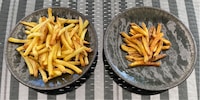
Guide
Does double frying lead to perfect homemade fries?
by Raphael Knecht

Making the perfect chips yourself: easier said than done. I'm not talking about oven fries, wedges or other wannabes - I want the original. The third time I pre-cook the potato sticks in vinegar water.
On my first attempt, I was far from perfect fries. The second attempt with double-fried fries tasted much better. They were more flavourful and crispier. But I'm still not completely satisfied and have the feeling that there's still room for improvement. Thanks to extensive research and helpful comments from the Community, I came across another interesting tip: I need to completely remove the starch from the cut potato sticks after cutting them in boiling water. Adding table vinegar is also supposed to work wonders. Will these steps get me closer to the perfect homemade fries?
Switching from frying once to twice has made the fries more flavourful and crispier. Now an extra step should finally take me to fries heaven. As before, I cut the potatoes into seven-millimetre-thin sticks using the chip cutter. As before, I use both waxy and floury potatoes for the fries - I still haven't been able to decide on one type because both have their advantages. This is where the change comes in: instead of drying the potato sticks as before, I boil them in water mixed with two tablespoons of table vinegar for just under ten minutes. I then deep-fry them in two batches. First for three minutes in oil heated to 150 degrees Celsius, then I let them cool to room temperature. Now comes the second frying process, at 180 degrees Celsius for about four minutes. I deliberately increase the temperature by ten or five degrees because many recipes also work with these values.
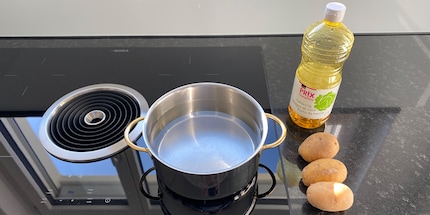
While looking for tips for the perfect fries, I came across the tip about vinegar water thanks to recipes and the help of the Galaxus Community. It is supposed to prevent the fries from browning too quickly during frying before they can even become crispy. Blanching with vinegar also prevents me from having a crispy coating but almost no filling in the fries. This is because it strengthens the potato structure and ensures that the fries keep their shape, don't lose their contents and can turn an even golden brown colour. To ensure that the inside remains nice and fluffy and does not become soggy, the potato sticks must lose as much starch and moisture as possible when they are pre-cooked in hot water. The two frying processes do the rest.
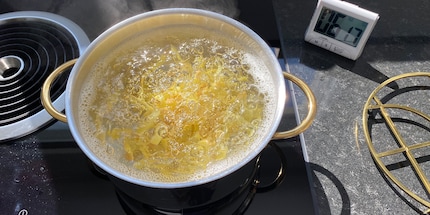
Enough of the many words, let the deeds follow. I cut the potatoes into thin sticks. In the meantime, I've really come to love the chip cutter because it takes the tedious work out of my hands with just one movement. Now I cook the sticks in a saucepan filled with just under two litres of water and two tablespoons of table vinegar. The recipes and comments talk about ten minutes. I choose eight minutes because my sticks are thinner than in most instructions. If I cook the potato sticks too long and they fall apart, the fries would be ruined. I then dry the fries, deep-fry them for three minutes at 150 degrees Celsius and leave them to drain and cool on a wire rack lined with kitchen paper. Six hours later, I toss them into the deep-frying oil at 180 degrees Celsius for a further four minutes to finish off the delicacy. Just before the kitchen alarm clock rings, I ask myself: was all the effort really worth it?
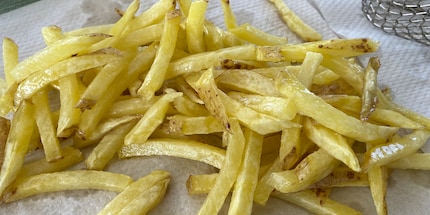
Oh, yes, it was worth it - and how! The chips made from waxy potatoes look great when I take the lid off the deep fryer. Nicely browned, not too light, but not too dark either. But are they crispy? Yep, they are. I can hear it as soon as I tip the chips out of the frying basket onto kitchen paper to drain. The first fry I try confirms: these are very tasty fries, close to perfection - very close indeed. Even after the first frying process, a thin crust was visible on the fries. The potato sticks have the vinegar bath to thank for this. The fries are extremely crispy, which I clearly notice when I bite into them. They are also no longer as dark as the first two attempts. The contents are nice and creamy and the flavour is there too. After about ten or fifteen minutes, the fries lose their crispiness, but still taste delicious.
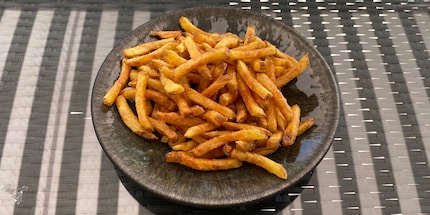
And what do the deep-fried sticks made from floury potatoes do? They are in no way inferior to their counterparts. Here too, the potato sticks are coated with a thin crust after the first frying process. The pre-cooking in vinegar water has definitely paid off. As with the first two attempts, the floury chips are lighter in colour than their waxy counterparts. They are crispier on the outside and fluffier on the inside, which I like. The classic earthy potato flavour is also present and the unmistakable frying aroma hits my nose. Even though I like the flavour of the chips made from waxy potatoes a little better, on balance I would still opt for the floury version. The long-lasting crispiness, fluffy filling and golden yellow colouring make up for the slightly less pronounced potato flavour.
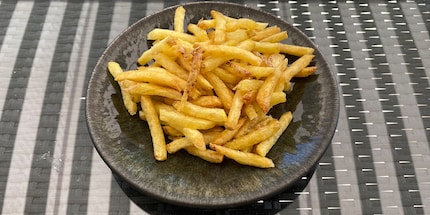
My fries project is full of surprises. I'm still experiencing one on my third attempt. I wouldn't have thought it possible that the bath in boiling vinegar water would make the fries even crispier and more flavourful. After pre-cooking and frying for the first time, I even had doubts as to whether something might have gone wrong: The fries looked anything but appetising, as they did on the second attempt. Pre-cooking adds a slightly sour vinegar flavour to the soggy, once fried potato sticks. Fortunately, this disappears after the second frying process. In the end, everything worked out and I have two plates of excellent fries in front of me. Had, or rather had, because they were eaten in no time.
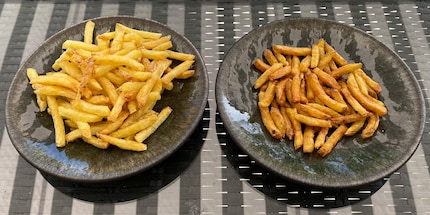
But: Is even more possible? I don't think so. Nevertheless, I'm leaving no stone unturned and giving it another chance. For my next and hopefully last attempt, I will also freeze the fries overnight before frying them for the second time. Will this be the final step to perfect homemade fries? I'll find out soon enough. Do you have any other tips that I should bear in mind? Then let me know in the comments column. If you'd like to follow me on my journey to the perfect homemade fries and are hungry for more, then follow me by clicking on the "Follow author" button.
Practical solutions for everyday problems with technology, household hacks and much more.
Show all